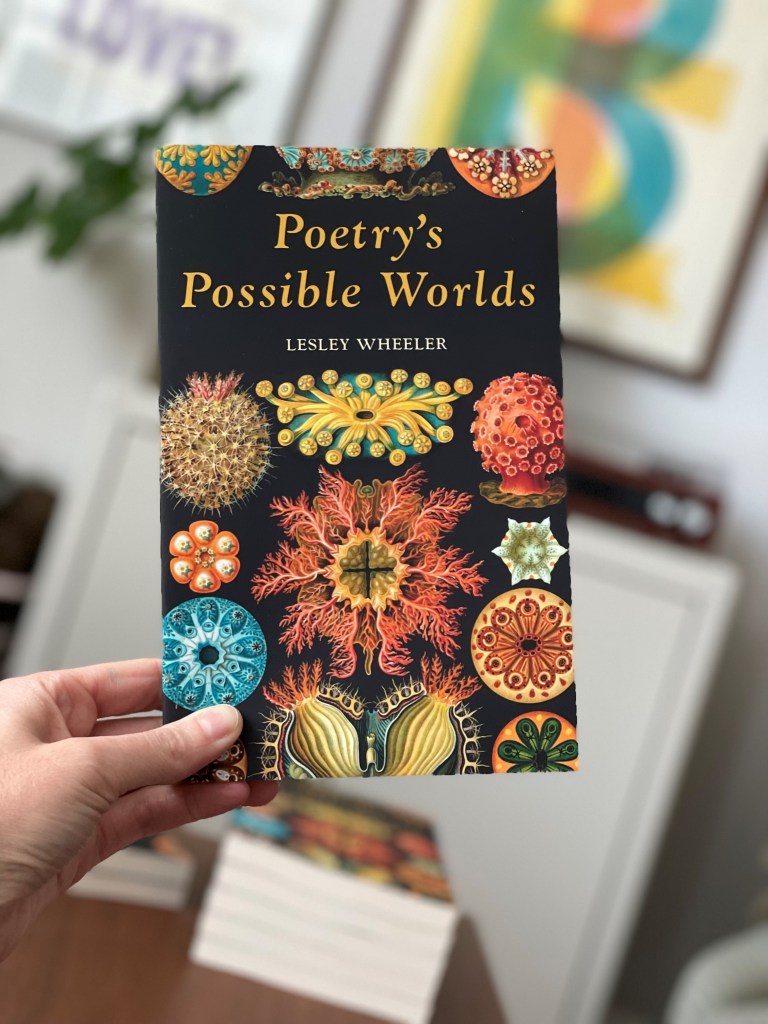
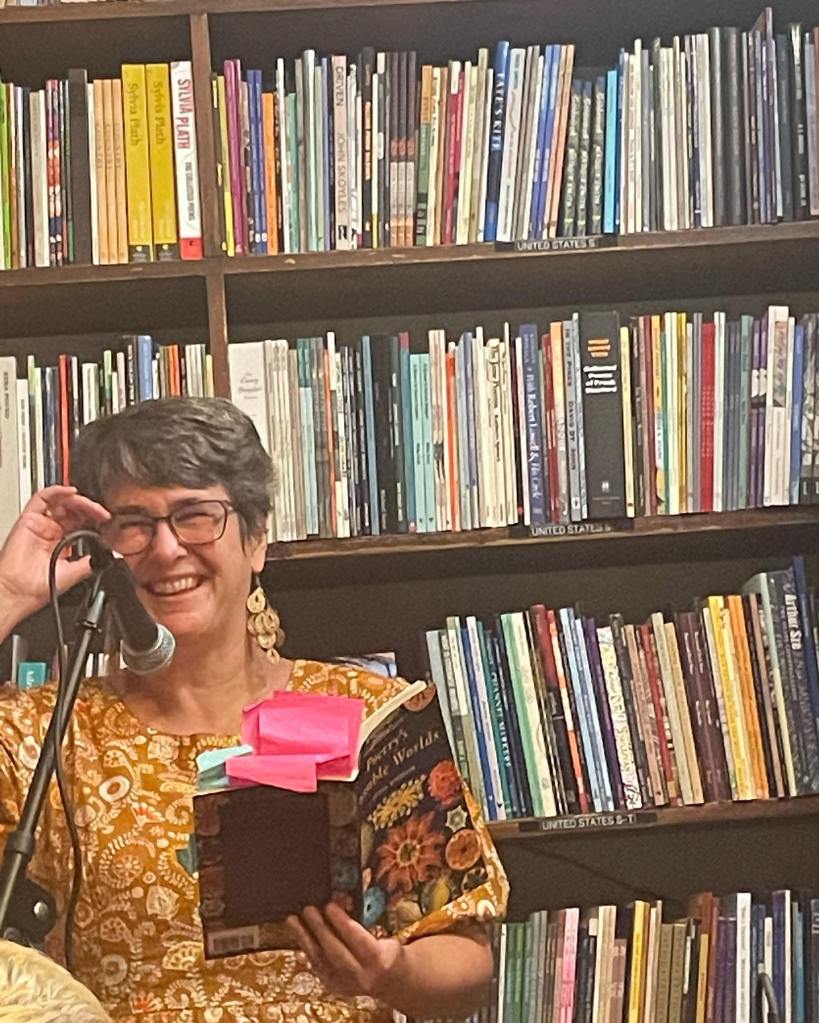
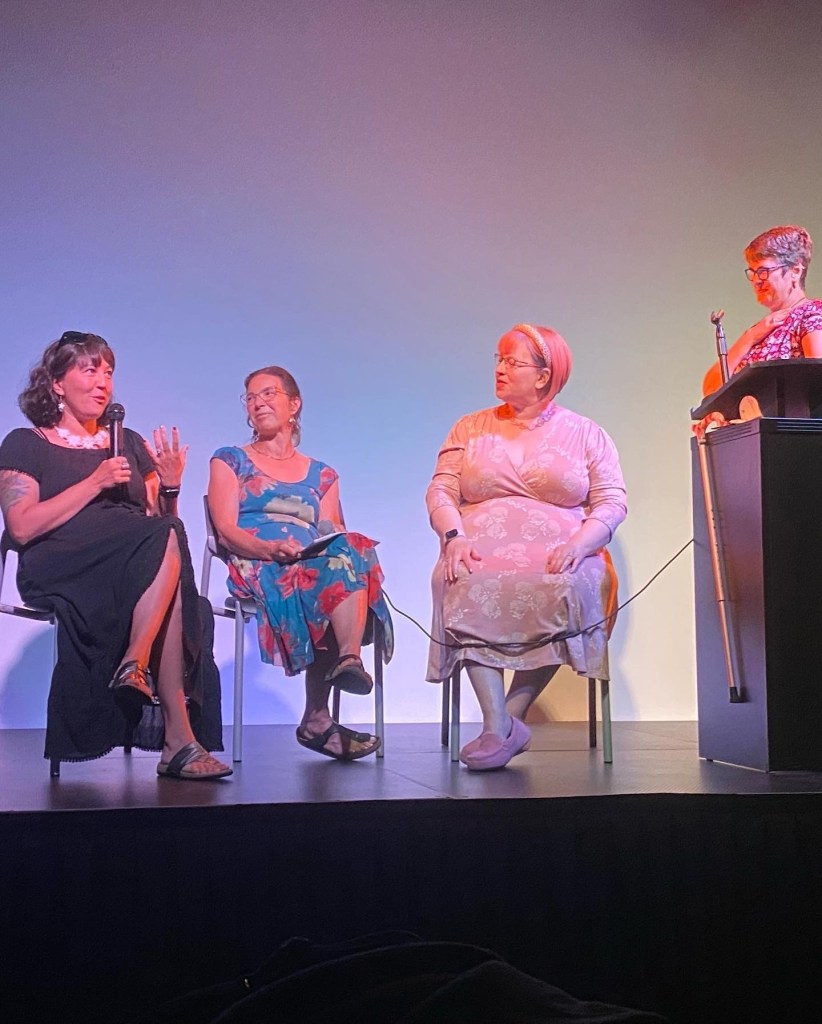
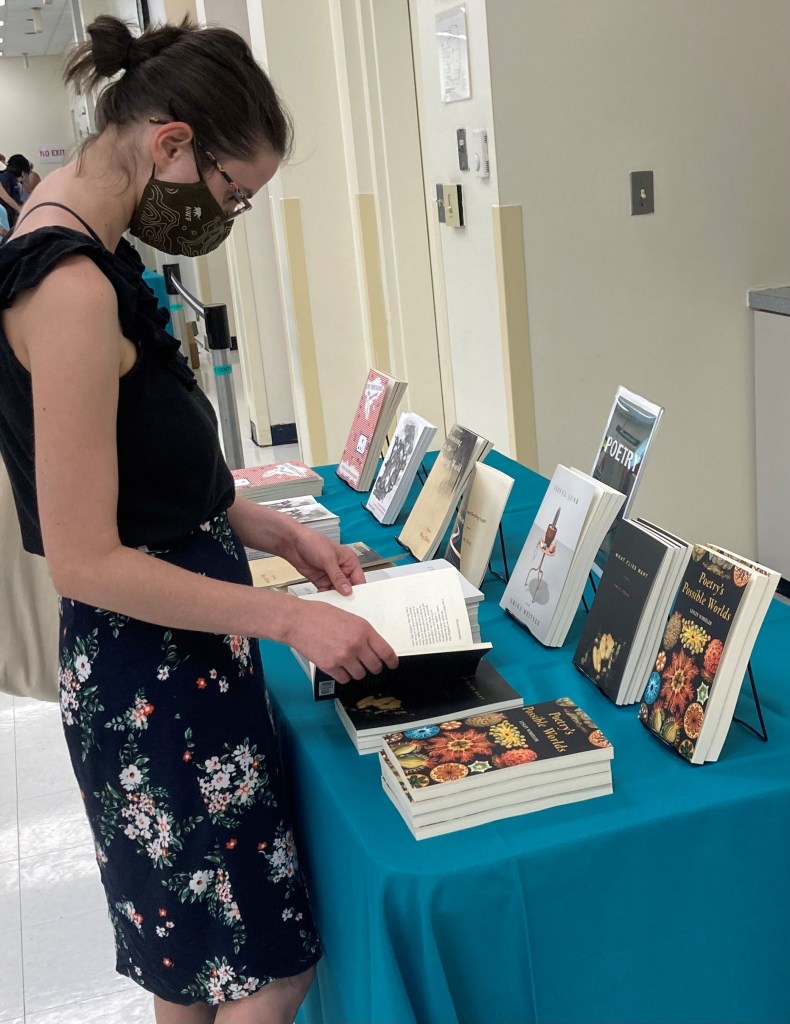
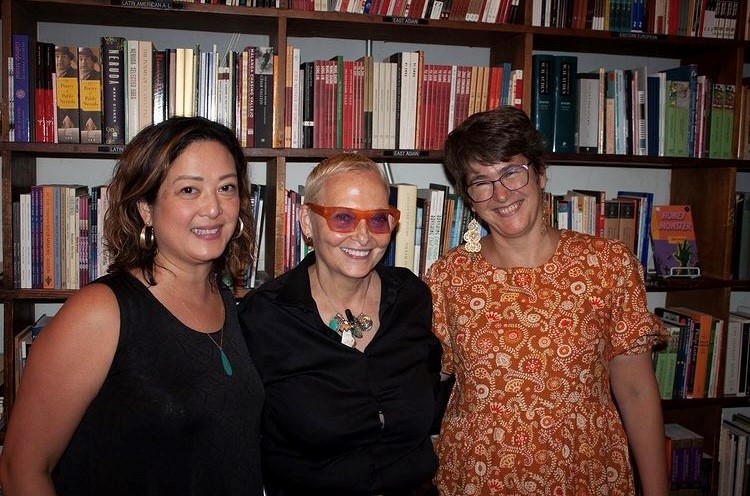
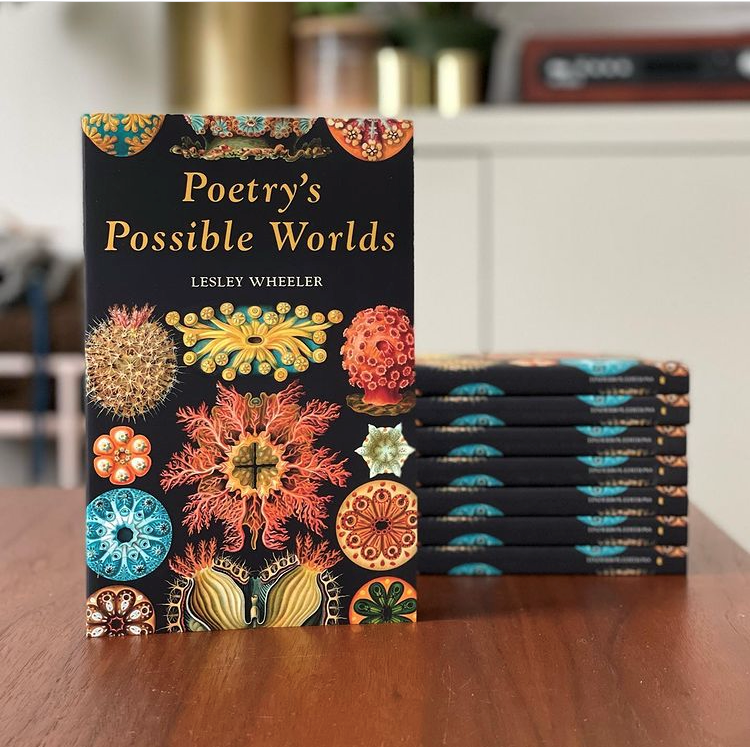
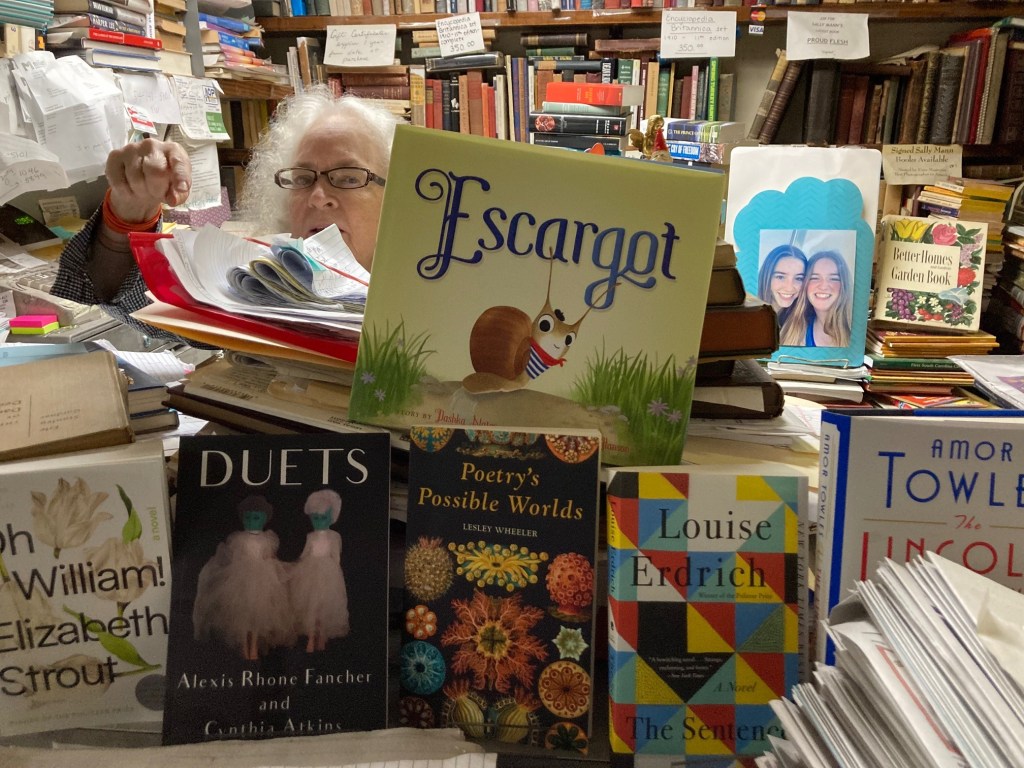

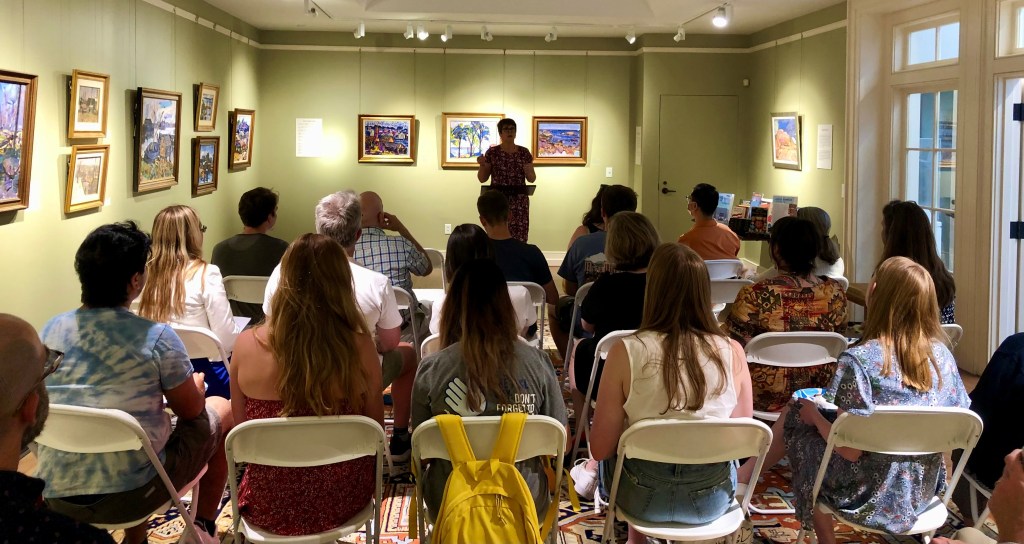
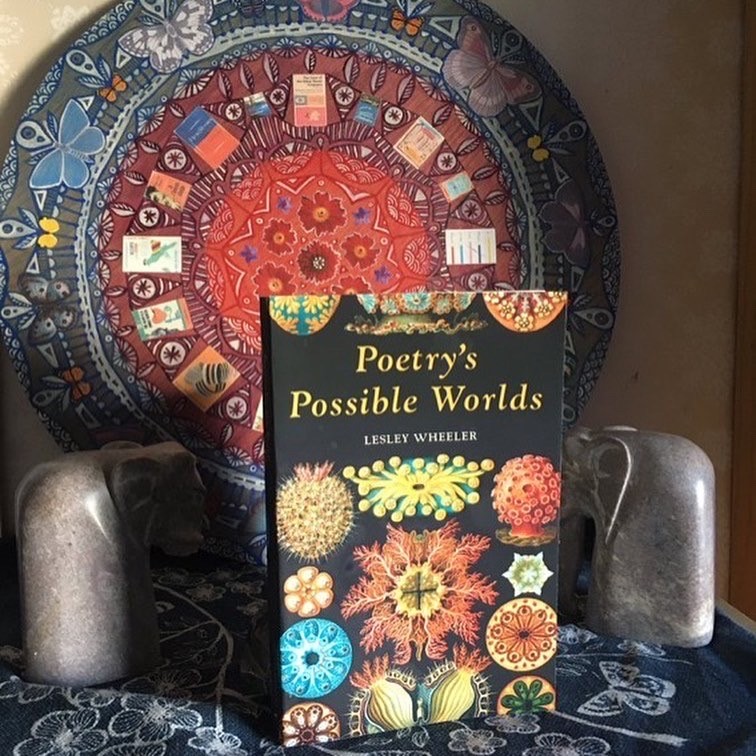

Happy 6-month birthday, little book. Thanks to all the friends who sent and posted these baby and launch portraits, and to the reviewers, personal-note-writers, and quiet book-buyers. I feel guilty that chairing my department has slowed down my promotion efforts, so as always, if you have suggestions for events or other ways of getting the word out, I’m glad to hear them–sometimes I just need a nudge (hey, Lesley, apply for this!). I will be presenting at NEMLA and AWP in March, and I have a couple of other Virginia events lined up; I’m also grateful to Anna Maria Hong, whose hybrid writing class at Mt. Holyoke I’m Zooming into Monday. Talking to students and other writers about Poetry’s Possible Worlds is pretty much my favorite. Bonus: while I like doing that in person, it’s sweet to do some things virtually, too, especially because air travel has been even worse this year–as in last weekend, when a trip home from a festival that should have taken 8 hours took 24.
I was a little uneasy in advance of the latter event, C.D. Wright Women Writers Conference, because the organization seemed wobbly (I think the usual director is sick, though I’m not sure). It was stellar, though, and I’m not just talking about the amazing people on my own panel on hybrid and multigenre writing, “Thriving Among, Across, Between Genres.” Literally every event I went to was great, and that’s NEVER true–plus between events, there was an ethos of inclusion and mutual excitement about literature. No book fair this year, but a glorious book-trading frenzy occurred at the final reception. Ananda Lima also created a post-conference shared document for posting our contact info and sales links, so I’ll be doing follow-up shopping. I don’t think I can go next year–Arkansas isn’t easy to get to from Virginia–but I hope the festival remains vibrant and I can revisit it someday.
Also logistically complicated but rewarding: I winnowed a great pool of Shenandoah submissions this week to just 12 poems to hand off to this year’s Graybeal-Gowen Prize judge, Oliver de la Paz. It’s hard to make final decisions on my own, especially when I get down to the poems that move and surprise me most. Distinguishing degrees of power and artfulness can seem impossible. I eventually used a strategy that helps me revise my own work: I read some semifinalists aloud. It’s radically clarifying. You hear sound patterns and other kinds of artfulness; you also hear the wordy or clumsy passages that most poems contain (very much including mine). The poems I rejected this week were really good; the ones I kept in the mix were really good and also damn close to fully realized.
Meanwhile, the fall issue of Shenandoah is nearing launch (proofreading time!); course registration madness is almost done for the moment (SO MANY emails from upset people!); and Thanksgiving Break approacheth. Thank god. In case you have a little writing and thinking time coming up, here are the prompts from our panel, with thanks to their brilliant authors.
In That Kitchen, from Ann Fisher-Wirth
This is a timed, 20-minute free-write using a trigger phrase that will start you out, and to which you will return every time you get stuck. It may eventually become part of a story or memoir, it may lead to prose poetry or lineated poetry, or it may lead nowhere—who knows. In any case, it’s the one exercise I’ve found most rewarding for both my students and myself, because seemingly everyone has rich and deep associations with kitchens.
So: having your paper or journal handy, begin by writing down the phrase “In that kitchen” and just keep going. Do not stop. Do not cross out or erase anything. Do not worry about spelling correctly or being grammatical or anything else. Your job is not to worry or judge yourself or feel stupid. Your only job is to write. And if you get stuck, write again the phrase “In that kitchen,” and keep writing it until you get unstuck and the words begin to flow.
When the twenty minutes are up, you may have finished something, or you may be in the middle of something you’ll want to continue later.
Fun with Genre Cross-Fertilization, from Sharon Harrigan
Sometimes I find that my fiction first drafts lack the intimacy and authenticity of my nonfiction and so I use a trick to get the best of both worlds. I take a fictional story idea and put it in a personal essay structure. Then, after I’ve achieved the tone I want, I allow myself to move outside that structure and let it expand into a short story or novel.
For this prompt, think of a personal essay in its simplest form: one dramatic moment in the writer’s life. For instance, pretend you are writing a Modern Love column. You might start with something from your own life or from the life of someone you know. Write it out. Then, after you have that intimate tone, change some of the details. Maybe change the POV from first to third, maybe write it from a different character’s POV. Maybe change the genders, the setting, whatever. Add more backstory, suspense, magic, if you want: but keep that memoir-like tone.
Cross-Genre Conversation, from Hyejung Kook
1) What is a piece of art or writing you feel smitten with? What is a piece of art or writing you feel challenged by? Choose one of these to have a cross-genre conversation with.
2) Freewrite for 5 minutes, rendering with as much detail as possible 3-5 aspects you especially love/are provoked by.
3) If you write prose, write one stanza to each of the aspects from step 2. Each stanza should be the same number of lines. Use the second person as often as possible.
If you write poetry, write one paragraph to each of the aspects from step 2. Each paragraph should have a different number of sentences. Use the second person as often as possible.
4) Give the piece a voice. How would it talk back to each stanza or paragraph you’ve drafted? Splice in this responding language if it feels appropriate. Or perhaps the response is in fact the piece you are writing.
Litany, from Laura Minor
Make a litany poem of all your fears. Revise the poem to switch up all the fears for wishes. Make the line endings surreal now. Push up against the wishes with the original astringency of the fears. End on four meditations. Now revise those meditations into prayers. Now revise those prayers into nouns. Now revise those nouns into images. Make a confession for the title and let it do the heavy lifting of the poem’s content for you.
Conjunctions, from Lesley Wheeler
Choose one of the seven coordinating conjunctions: for, and, nor, but, or, yet, so. Beginning with that word, start writing about what would help you thrive today, calling on as many senses as possible and not worrying about whether the words come in paragraphs or lines. Whenever you get stuck, return to the conjunction. You might want to write, too, about why you chose that conjunction or even just riff on the sound of the word.
Reverse Erasure, from Brenna Womer
Pull up a piece of writing that’s incomplete—something that’s been languishing in your drafts folder, eyes wide, waiting. Now, in a different font color or using parentheticals, breathe new life into the existing text by writing something entirely different among, across, and between what’s already there. Maybe the new writing is in conversation with the old; maybe they’re entirely different narratives; maybe they’re not narrative at all; maybe all you end up with is a feeling.